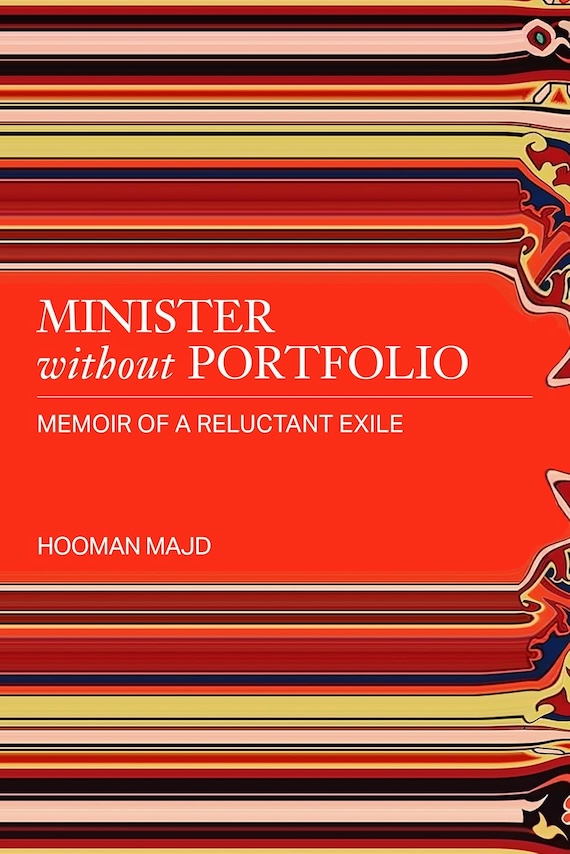A Review of Minister Without Portfolio: Memoir of a Reluctant Exile by Hooman Majd.
Detroit (Special to Informed Comment; Feature) – Everybody needs a home. For Iranian-American writer Hooman Majd, finding a home was an elusive pursuit. He lays out his lifelong struggle for identity and belonging in his wonderful new book, Minister Without Portfolio: Memoir of a Reluctant Exile (ZE Books, 2025). Majd is the author of a trio of books about Iran: The Ayatollah Begs to Differ: The Paradox of Modern Iran (Doubleday, 2008), The Ayatollahs’ Democracy: An Iranian Challenge (Norton, 2010) and The Ministry of Guidance Invites You to Not Stay (Doubleday, 2013). His solid reputation as an interpreter of Iran was also built on his articles in The New York Times, Foreign Affairs, The Guardian, The New Republic, The New Yorker and by his many appearances on television and radio programs, such as NPR, NBC News, and The Daily Show with Jon Stewart.
The son of a top diplomat for the Shah of Iran, Majd lived a charmed life of international travel, servants and elite schools. However, the 1979 Iranian Revolution changed everything for him and his family for the worse. His father lost his job and could no longer financially support his son on a student visa in the U.S. Majd’s life was shattered. He considered seeking asylum in the U.S., but he knew it was a hopeless cause in the face of anti-Iranian backlash over the American Embassy hostage crisis. Instead, he became an “illegal immigrant.” Majd was a trapped man without a country or a clear future. “I couldn’t help but feel lost,” he writes, “like so many of my fellow Iranians in the States, but without a firm sense of home, I wasn’t sure what it was I’d forfeited.”
To make ends meet, he drove limousines in Washington, sold Gucci watches, worked as a hotel clerk and sold real estate in California. These experiences proved useful as he met helpful contacts and his future employer, Chris Blackwell, the founder of Island Records. Majd cleared up his immigration status and immersed himself in the topsy-turvy world of the music and entertainment businesses.
Majd presents his story of survival and reinvention in rich detail. It is the kind of astonishing story that would make a great movie. What stands out in his book is his will to survive against all odds. He conquered his fear about going back to Iran after a 32-year absence. His visit to Iran completely changed his life and career. Majd became a sought-after writer and interpreter of his homeland because of his keen insights and close political contacts within the government of Iran. His work was published in top-flight American publications, and he was interviewed by major media outlets. He became a media star because of his authentic voice and intimate knowledge of one of the most misunderstood countries in the world.
Majd’s three books also gave him high visibility to a wide popular audience. While I was working in the Sultanate of Oman, I was assigned by The Christian Science Monitor (October 24, 2008) to review his first book, The Ayatollah Begs to Differ: The Paradox of Modern Iran. His book was a frank deconstruction of Iran in all its complexity, warts, and all. He also challenged lazy stereotypes and preconceptions about Muslims and Iran, which were lingering since the American Embassy hostage crisis in 1979. Prejudice toward Iran persists today, unfortunately. Much of it is rooted in Islamophobia and xenophobic fear of others who do not think, dress, pray or live like we do in the West.
Majd’s book is full of beautiful photographs and documents from his life and career. It is a scrapbook of an interesting life. Chris Blackwell gave Majd his title, “Minister without Portfolio,” when he worked for him at Island Records. It is the perfect title for his memoir because Majd was a productive dynamo and able to do anything to invent and reinvent his life.
Majd admits that he never really had a home, but it suits him. What he had was the freedom to create, to imagine and to live with uncertainty. That is priceless.



 © 2026 All Rights Reserved
© 2026 All Rights Reserved